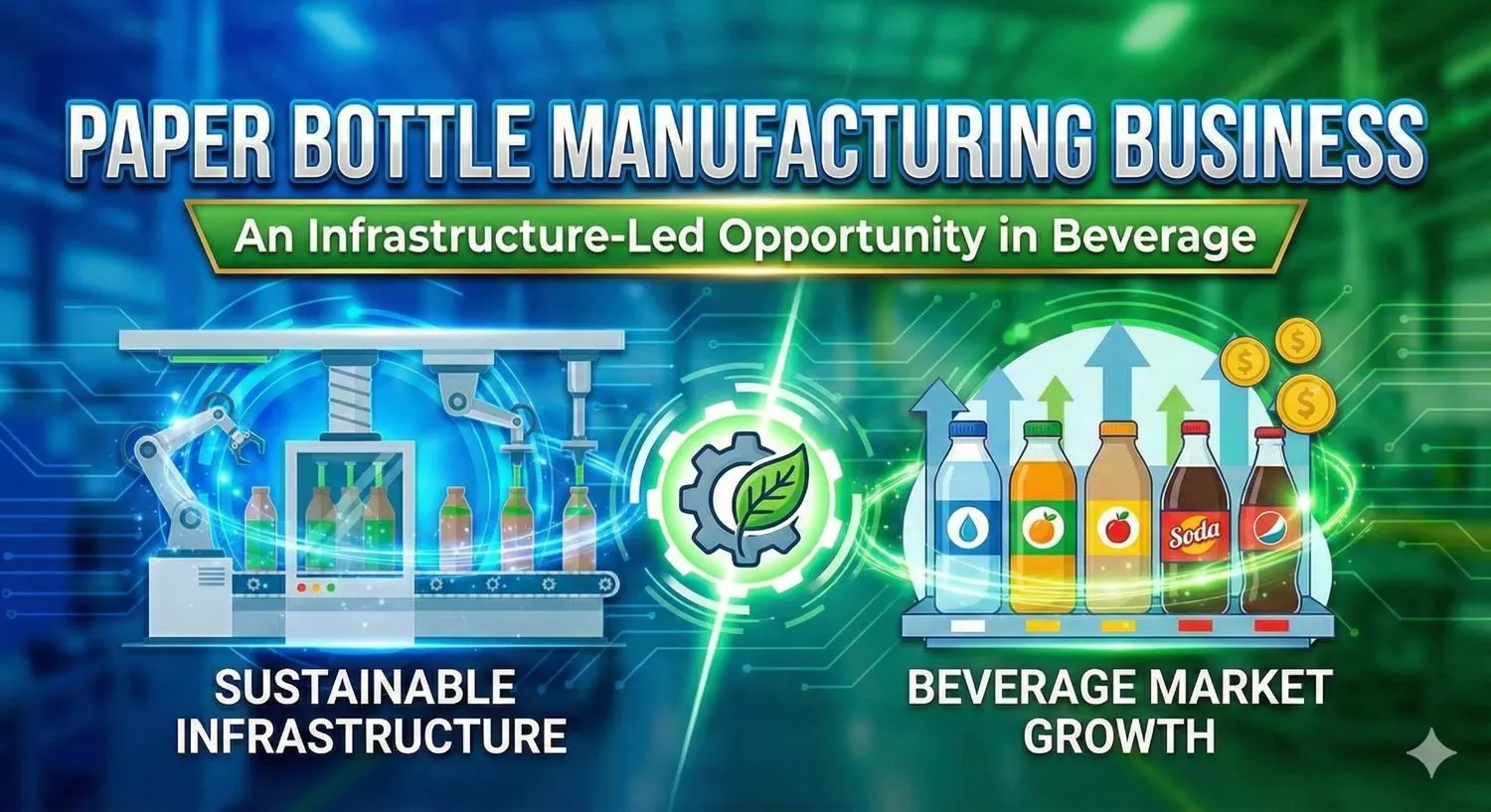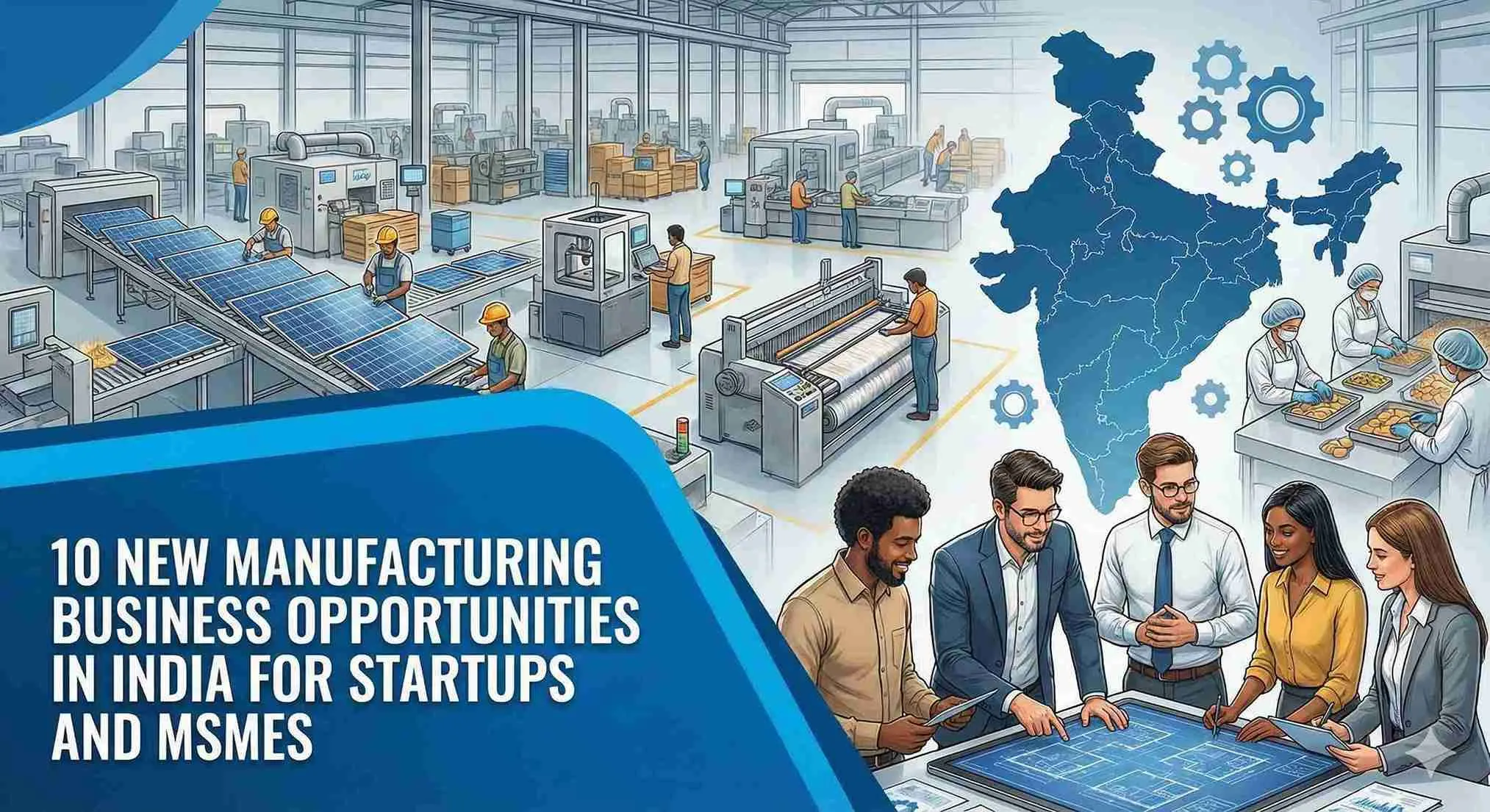
India’s Micro, Small, and Medium Enterprises (MSME) sector serves as the backbone of the nation’s economy. It plays a crucial role in employment generation, GDP contribution, and export expansion. For aspiring entrepreneurs, identifying viable MSME projects is often the first step toward starting a profitable business. Drawing inspiration from NPCS Newsletter Issue 12/2016, this article presents a curated MSME business list filled with innovative project opportunities, startup ideas, and manufacturing prospects. With the right strategy, proper guidance, and market understanding, these MSME ideas can transform your vision into a sustainable venture.
Contents
- 1 Startup Opportunities from the MSME Business List
- 1.1 1. Food Processing & Agro-Based Industries
- 1.2 2. Herbal, Ayurvedic & Natural Products
- 1.3 3. Plastic, Packaging & Polymer-Based Products
- 1.4 4. Chemical, Paints & Industrial Formulations
- 1.5 5. Engineering & Fabrication Units
- 1.6 6. Paper & Printing-Based Industries
- 1.7 7. Textile, Apparel & Fashion Products
- 1.8 8. Renewable Energy & Waste Management
- 1.9 9. Livestock & Aquaculture Projects
- 1.10 10. Import Substitution & Export-Oriented Units
- 2 Conclusion
Startup Opportunities from the MSME Business List
India’s industrial landscape is rapidly evolving, and the MSME segment is responding with agile, cost-effective, and scalable solutions. Below are categorized startup opportunities highlighted in the NPCS newsletter, each offering high-profit potential and growth prospects.
See Also – 50 Projects to Start with ?500000
1. Food Processing & Agro-Based Industries
India’s strong agricultural base ensures a steady supply of raw materials for food-based industries. The MSME business list includes:
a. Fruit and Vegetable Processing
Projects like canned tomatoes, pickles, fruit juices, and frozen vegetables enjoy high demand. These businesses require moderate investment and promise steady returns.
b. Dairy-Based Products
The production of milk powder, flavored milk, ghee, and cheese continues to rise. Moreover, the market for value-added dairy products is expanding both locally and globally.
c. Spices and Condiments Manufacturing
Spices are integral to Indian cuisine, and exports are booming. Establishing spice powder units or blended masala businesses offers a sustainable opportunity.
2. Herbal, Ayurvedic & Natural Products
India’s rich tradition in Ayurveda and herbal medicine positions these industries for both domestic sales and exports. Key ideas include:
a. Herbal Cosmetics
From aloe vera creams to ayurvedic shampoos, this segment blends ancient knowledge with modern branding.
b. Medicinal Plants Processing
Cultivation and extraction of herbs like ashwagandha, tulsi, or brahmi for supplements or health tonics offer scalable opportunities.
c. Essential Oils & Aromatherapy Products
Lavender, lemongrass, eucalyptus, and rose oils are widely used in personal care and aromatherapy industries.
As a result, these ideas are not only profitable but also appeal to eco-conscious and health-focused consumers.
3. Plastic, Packaging & Polymer-Based Products
The demand for innovative and cost-effective packaging is fueling plastic and polymer-based startups. The MSME business list highlights:
a. PET Bottles and Jars
These are widely used in the food, pharma, and beverage sectors. A plant with blow molding machinery can produce bulk units efficiently.
b. Flexible Packaging Materials
Multilayer pouches, laminated rolls, and food-grade packaging are essential across industries, especially with the rise in FMCG and e-commerce.
c. Thermoforming & Vacuum Forming
Used for disposable plates, trays, and packaging containers, this industry is gaining momentum due to single-use packaging needs.
4. Chemical, Paints & Industrial Formulations
India’s growing construction, automotive, and manufacturing sectors require high-grade chemicals and industrial formulations.
a. Adhesives, Sealants & Glues
These are critical in packaging, footwear, furniture, and construction sectors.
b. Detergents and Cleaning Chemicals
From domestic use to industrial applications, cleaning agents enjoy year-round demand.
c. Paints and Coatings
Interior and exterior paints, varnishes, and automotive coatings are part of India’s expanding real estate and auto market.
In contrast to large chemical plants, MSME setups can succeed with niche focus and superior quality control.
5. Engineering & Fabrication Units
The MSME business list from NPCS also includes engineering-based enterprises that support construction, automotive, and infrastructure development.
a. Welding Electrodes Manufacturing
These are vital in shipbuilding, bridges, and structural engineering projects.
b. Auto Parts & Components
Starter motors, piston rings, alloy wheels, and bearings are examples of parts that can be manufactured on a small scale with CNC and lathe equipment.
c. Fabricated Steel Structures
Grills, gates, storage racks, and sheds are in continuous demand in both urban and rural areas.
By targeting industrial zones or infrastructure projects, such businesses can scale with strong client relationships.
6. Paper & Printing-Based Industries
Eco-friendly alternatives and customizable solutions make these projects appealing for MSMEs.
a. Paper Bags & Carry Bags
With plastic bans in many states, paper bag manufacturing presents an immediate opportunity.
b. Offset Printing & Packaging
Labels, cartons, posters, and brochures continue to serve both corporate and retail clients.
c. Notebooks and Stationery
Targeting school supply chains or creating customized corporate gifts opens up further markets.
As a result, paper-based MSMEs also contribute to sustainability and employment generation.
7. Textile, Apparel & Fashion Products
Textile MSMEs dominate India’s rural and semi-urban areas. The MSME business list includes:
a. Ready-Made Garments
Stitching units producing T-shirts, ethnic wear, or uniforms cater to mass and niche segments alike.
b. Jute and Coir Products
From bags to mats and handicrafts, these eco-products are gaining traction in global markets.
c. Embroidery, Tailoring, and Printing Services
Small units offering custom work can earn high margins with creative branding and quality.
8. Renewable Energy & Waste Management
With rising environmental concerns, startups in green tech and circular economy are vital.
a. Biomass Briquettes
Made from agricultural waste, they substitute coal in industries.
b. Solar Panel Assembly
Small-scale solar product assembly lines offer scope in rural electrification schemes.
c. E-Waste Recycling
Recovering valuable metals from e-waste is both profitable and environmentally essential.
Moreover, government subsidies and incentives can help you kickstart such projects with lower capital risks.
9. Livestock & Aquaculture Projects
These agriculture-aligned businesses are part of the MSME business list due to their consistent income potential.
a. Poultry & Layer Farming
Meat and egg production units enjoy good ROI due to rising protein consumption.
b. Fish Farming & Shrimp Hatcheries
India’s coastal regions and freshwater systems support scalable aquaculture ventures.
c. Dairy Farming & Milk Processing
Small dairies with chilling, pasteurization, and packaging units create value-added products like paneer and butter.
10. Import Substitution & Export-Oriented Units
NPCS also emphasizes MSMEs that can replace imported goods or expand India’s export capacity.
a. Activated Carbon from Coconut Shells
Used in air/water purification, its demand is strong in domestic and global markets.
b. Industrial Fasteners & Hardware
Nuts, bolts, rivets, and screws are essential for machinery, construction, and automotive industries.
c. Ayurvedic Capsules & Tablets
These products find buyers not just in India, but also in the U.S., Europe, and Asia-Pacific.
See Also – Micronutrient Fertilizer
Conclusion
The MSME business list from NPCS Newsletter Issue 12/2016 remains highly relevant even today. Whether you’re exploring food processing, herbal products, plastics, paper, or engineering, each idea comes with the potential for profitability, job creation, and long-term impact. Furthermore, government incentives, startup schemes, and digital marketplaces make it easier to launch and scale these ventures.
By aligning your strengths with a sector’s needs, conducting a feasibility study, and leveraging the right support ecosystem, you can transform any of these MSME ideas into a thriving business. As India positions itself as a global manufacturing and export hub, now is the ideal time to tap into these emerging MSME opportunities.














